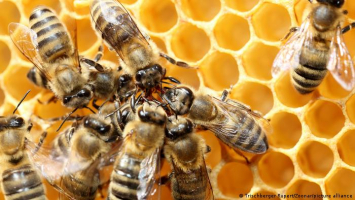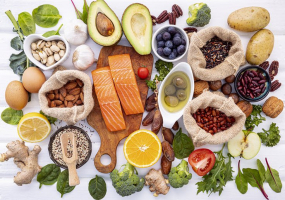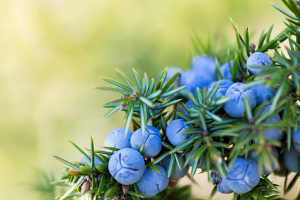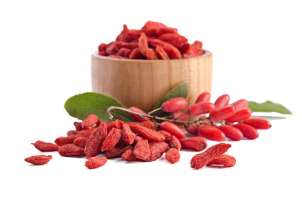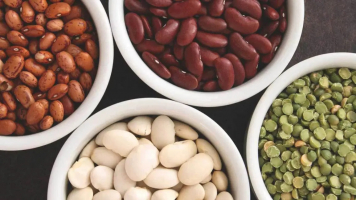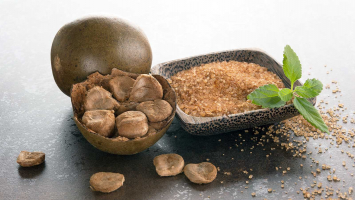Top 8 Healthiest Berries You Can Eat
Berries are small, spherical, squishy fruit that typically comes in blue, red, or purple hues. They have a sweet or sour flavor and are frequently added to ... read more...sweets, jams, and preserves. Berries often have a favorable nutrient profile. They often include significant levels of fiber, vitamin C, and polyphenol antioxidants. Therefore, including berries in your diet may aid in preventing and reducing the symptoms of several chronic conditions. These berries are the healthiest ones you can try.
-
Blueberries are popular berries that serve as a great source of vitamin K. One cup (148 grams) of blueberries provides the following nutrients:
- Calories: 84
- Fiber: 3.6 grams
- Vitamin C: 16% of the daily value (DV)
- Vitamin K: 24% of the DV
- Manganese: 22% of the DV
Anthocyanins, an antioxidant polyphenol, are also present in blueberries. Anthocyanins found in blueberries may lessen oxidative stress, which in turn lowers the risk of heart disease in both healthy individuals and those who are already at high risk for the condition. Diabetes risk may also be reduced by consuming blueberries. According to studies, blueberries or their bioactive components can increase insulin sensitivity and cut the risk of type 2 diabetes by up to 26%. People who consume blueberries also had fewer rates of cognitive decline, indicating their brains stay healthier as they age, according to a significant observational study. To pinpoint the precise function that blueberries have in maintaining brain health, more research is nonetheless required.
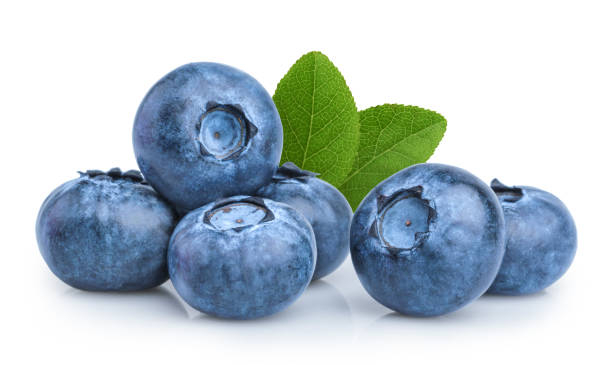
Blueberries 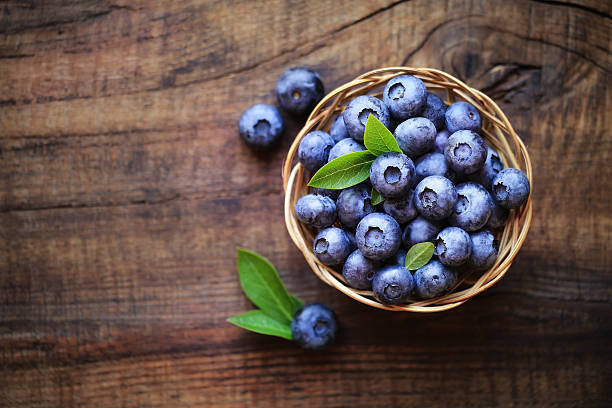
Blueberries -
Raspberries are often used in desserts and are a very good source of fiber. One cup (123 grams) of raspberries provides:
- Calories: 64
- Fiber: 8 grams
- Vitamin C: 36% of the DV
- Vitamin K: 8% of the DV
- Manganese: 36% of the DV
Raspberries also contain ellagitannins, an antioxidant polyphenol that helps lessen oxidative stress. One study found that the amount of oxidative stress brought on by exercise was greatly reduced when cyclists drank a beverage made of raspberries and other berries. The American red or European red types of raspberries are the most popular. But raspberries come in a wide variety of varieties. For instance, studies have revealed that black raspberries provide a number of health advantages. They might even be especially beneficial for heart health.
According to studies, black raspberries had lower blood pressure and cholesterol levels, which are risk factors for heart disease. Black raspberries may lessen inflammation in persons with metabolic syndrome, according to other studies. These trials, nevertheless, were incredibly small. The advantages of black raspberries need to be confirmed by additional research.
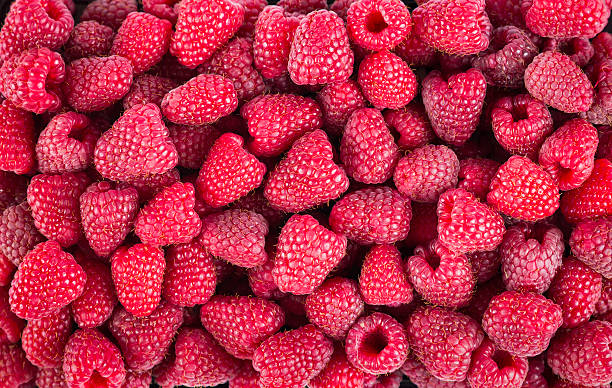
Raspberries 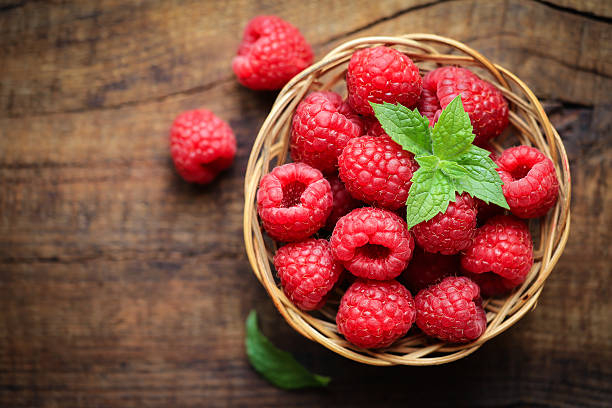
Raspberries -
Goji berries, also known as wolfberries, are native to China and used in traditional medicine. They have recently become very popular in the Western world. One ounce (28 grams) of dried goji berries provides:
- Calories: 98
- Fiber: 3.6 grams
- Vitamin C: 15% of the DV
- Vitamin A: 42% of the DV
- Iron: 11% of the DV
Zeaxanthin and vitamin A, both of which are crucial for eye health, are also abundant in goji berries. Eating 14 grams of a proprietary milk-based goji berry formulation every day prevented age-related loss in eye health, according to a study of 150 older persons. Both this study and another comparable one suggested that consuming goji berries might increase blood zeaxanthin levels.
Goji berries contain antioxidant polyphenols, much like many other berries do. According to one study, healthy older Chinese people's blood antioxidant levels rose after consuming goji berry juice for 30 days. In another study, participants who drank goji berry juice for two weeks saw an improvement in metabolism and a reduction in waist size. These studies are encouraging, however, they are somewhat tiny. Therefore, more study is required.
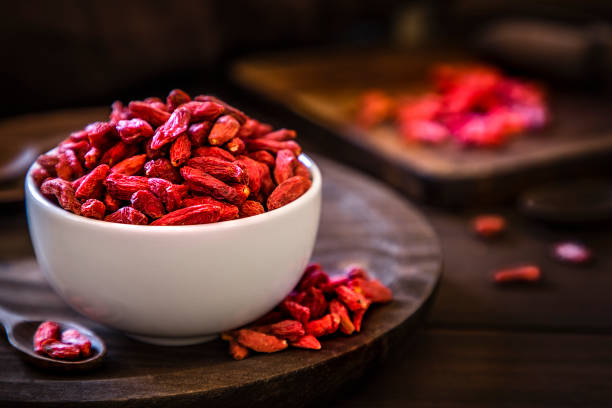
Goji berries 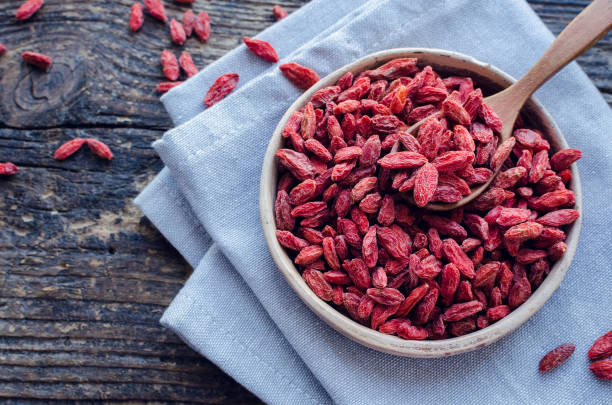
Goji berries -
Strawberries are one of the most commonly consumed berries in the world and also one of the best sources of vitamin C. One cup (144 grams) of whole strawberries provides:
- Calories: 46
- Fiber: 3 grams
- Vitamin C: 94% of the DV
- Manganese: 24% of the DV
The heart benefits of strawberries are numerous. In fact, a study of over 93,000 women discovered that those who had more than three servings of strawberries and blueberries per week had a risk of heart attack that was nearly 30% lower. Strawberries may lower a number of heart disease risk variables, including blood cholesterol, triglycerides, and oxidative stress, according to other studies. By reducing inflammatory substances like IL-1, IL-6, and C-reactive protein that are present in the blood, strawberries can help lessen inflammation (CRP).
Strawberries may also aid in blood sugar regulation, which is crucial for avoiding diabetes. In fact, a tiny study indicated that eating strawberries along with a high-carb, moderate-fat meal reduced the insulin response in overweight individuals. Last but not least, a different study found that consuming 2 ounces (60 grams) of freeze-dried strawberry powder per day decreased oxidative stress and inflammatory molecules in individuals who were at risk of developing esophageal cancer.
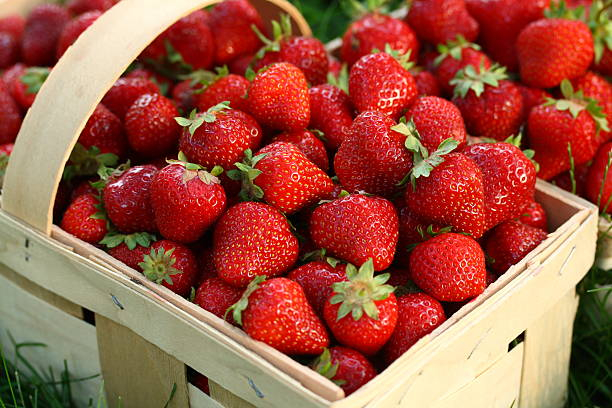
Strawberries 
Strawberries -
Blueberries and bilberries are frequently confused because of their similar appearances. While blueberries are indigenous to North America, bilberries are indigenous to Europe. One 3.5-ounce (100-gram) serving of bilberries provides:
- Calories: 48
- Fiber: 2.8 grams
- Vitamin C: 49% of the DV
- Manganese: 143% of the DV
According to tests conducted by scientists, bilberries can effectively reduce inflammation. People who are at risk for heart disease or metabolic syndrome may have less inflammation if they consume bilberries or drink bilberry juice, according to some. In a different investigation involving 110 women, it was discovered that consuming bilberries for around a month decreased the levels of endothelium indicators linked to the emergence of heart disease. Bilberries were also linked to a weight loss of 0.4 pounds (0.2 kg) and a reduction in waist size of 0.5 inches (1.2 cm). In a different study, it was discovered that persons with high blood sugar could lower their blood sugar by consuming a diet heavy in whole grains, salmon, and bilberries. Additionally, bilberries may lower LDL (bad) cholesterol and raise HDL cholesterol.
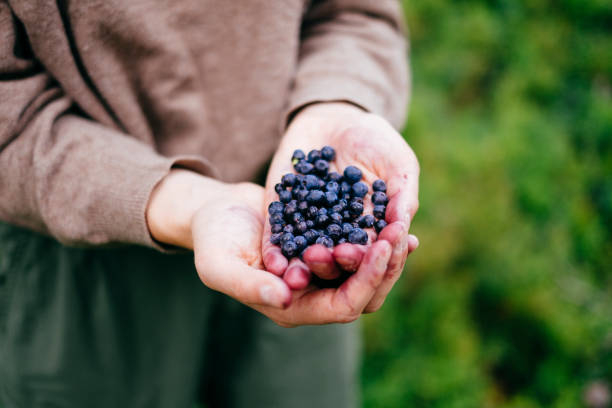
Bilberries 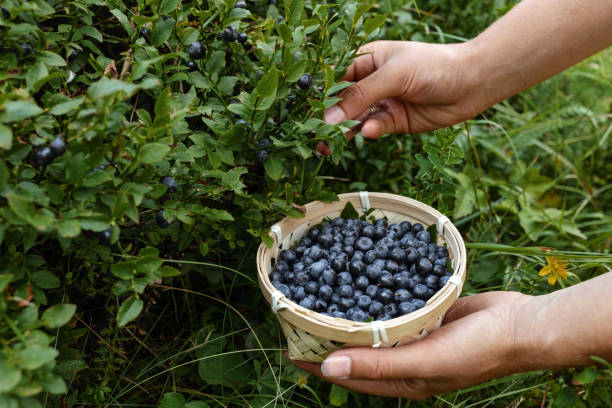
Bilberries -
The native acai palm trees of the Brazilian Amazon region produce acai berries. Because of their strong antioxidant content, they have become well-liked health dietary supplements. A serving of 3.5 ounces (100 grams) of acai berry puree provides:
- Calories: 60
- Fiber: 3 grams
Remember that acai berries are frequently eaten dried or freeze-dried, which can change their nutritional value. One of the best sources of antioxidant polyphenols is acai berries, which may have up to ten times as many antioxidants as blueberries. Acai berries can raise blood antioxidant levels and lower oxidative stress-related compounds when taken as juice or pulp. Additionally, persons with overweight who consumed 200 grams of acai berry pulp each day for a month had lower blood sugar, insulin, and blood cholesterol levels.
Athletes have also experienced these impacts. Consuming 3 ounces (100 ml) of an acai juice blend for six weeks lowered blood cholesterol and oxidative stress after exercise, which may hasten the healing of muscle injury, according to one study. Antioxidants found in acai may also help lessen osteoarthritis symptoms. In a trial of individuals with osteoarthritis, 4 ounces (120 ml) of acai juice per day for a period of 12 weeks considerably reduced pain and enhanced daily activities.
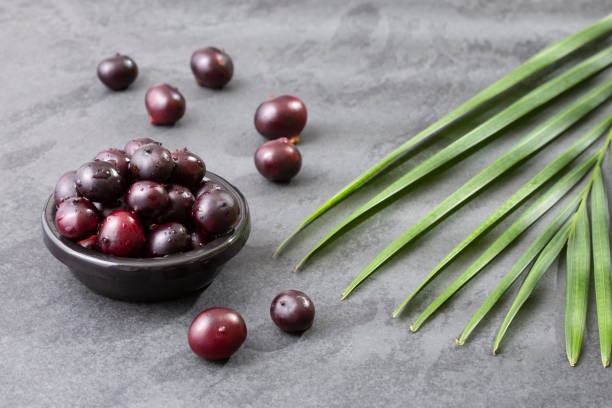
Acai Berries 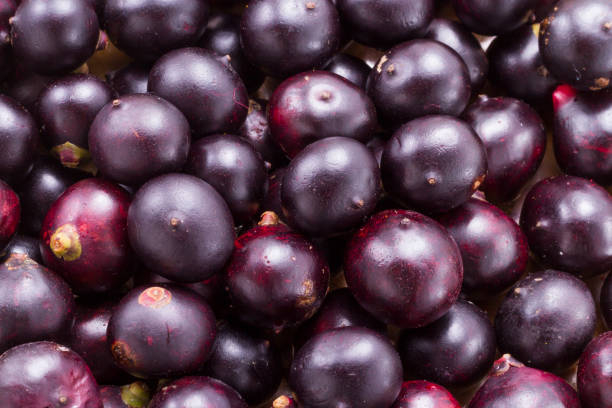
Acai Berries -
Cranberries are an extremely healthy fruit with a tart taste. That’s why they’re rarely eaten raw. Instead, they are commonly consumed as juice or as cranberry sauce. One cup (110 grams) of raw cranberries provides:
- Calories: 46
- Fiber: 3.6 grams
- Vitamin C: 16% of the DV
- Manganese: 11% of the DV
Cranberries contain antioxidant polyphenols as other berries do. The majority of these antioxidants are lost when they are made into juice, which is how they are typically ingested. Therefore, cranberry juice has fewer polyphenols than raw cranberries. The capacity of cranberries to help lower the risk of urinary tract infections is their most well-known health advantage (UTIs). Cranberries have certain qualities that stop the bacteria E. coli from adhering to the bladder or urinary tract walls, lowering the risk of infection.
Cranberry juice or cranberry supplements can lower the risk of UTIs, according to a number of studies. Additionally, cranberry juice may lower the risk of various infections. A form of bacteria called H. pylori can result in gastric cancer and stomach ulcers. Cranberry juice can help prevent infections, and H. pylori from sticking to the stomach wall and act as adjunctive therapy to antibiotics, according to a number of studies.
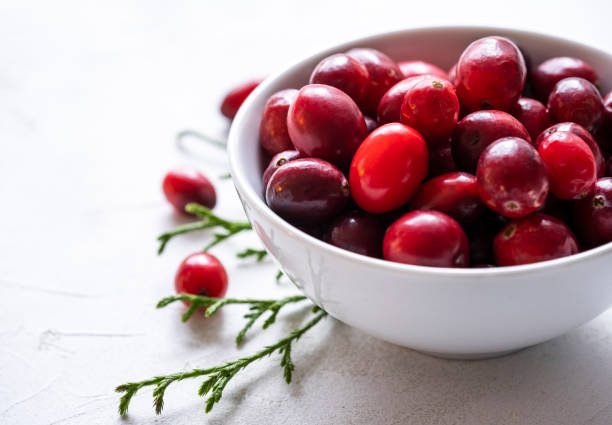
Cranberries 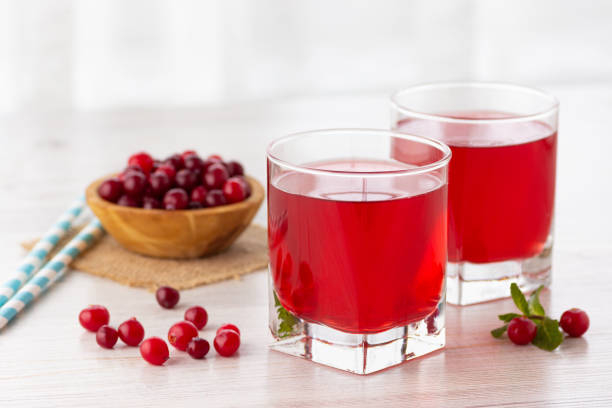
Cranberries -
Grapes are widely consumed either as whole raw fruit or in the form of juice, wine, raisins, or vinegar. One cup (151 grams) of whole raw grapes provides:
- Calories: 104
- Fiber: 1.4 grams
- Vitamin C: 5% of the DV
- Vitamin K: 18% of the DV
Grape skin and seeds are a fantastic source of anti-oxidant polyphenols. Grape seed polyphenol extracts have been found in studies to reduce blood pressure and heart rate. But many of these investigations were modest in size. And according to other studies, it's still unclear how polyphenols affect blood pressure. Eating grapes or raisins three times per week was linked to a 12% lower risk of type 2 diabetes, according to a major observational study.
In another study, high cholesterol patients who consumed 500 grams (17 ounces) of grapes every day for eight weeks saw a reduction in oxidative stress and blood cholesterol. And last, grape juice might even be good for your brain. Drinking 12 ounces (355 ml) of Concord grape juice every day for 12 weeks dramatically enhanced memory and driving performance, according to a small clinical experiment involving 25 women.
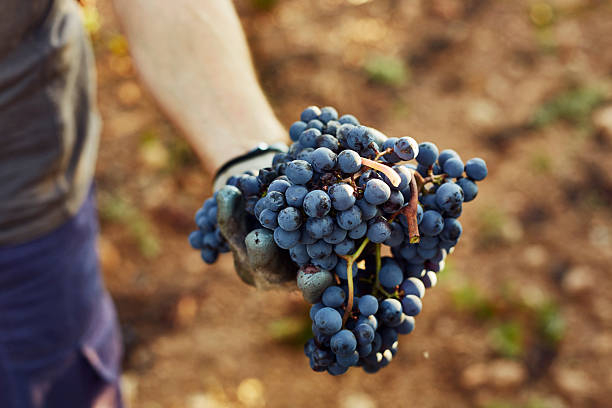
Grapes 
Grapes















